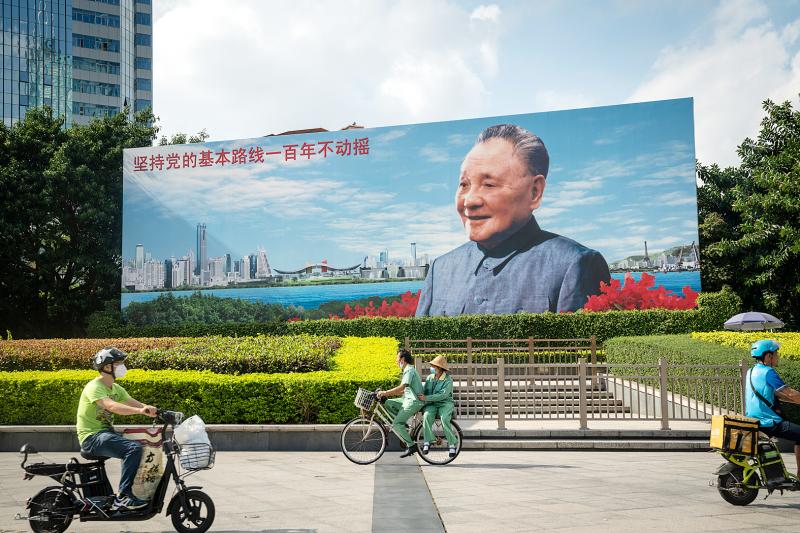Chinese President Xi Jinping (習近平) on Thursday declared victory in an eight-year drive to eradicate extreme poverty in the world’s most populous nation, a key goal of the ruling Chinese Communist Party (CCP).
“We have achieved in a timely manner the poverty alleviation goal of the new era,” Xi said at a meeting of the seven-member Politburo Standing Committee, China’s supreme decisionmaking body, the official Xinhua news agency reported.
The incomes of nearly 100 million people had moved above China’s official poverty line — defined as those who earn less than 11 yuan (US$1.68) per day, he said.

Photo: Bloomberg
After assuming leadership of the CCP eight years ago, Xi made the drive to eliminate extreme poverty by this year one of his top goals.
The party defines it as a step toward achieving what it calls a “moderately prosperous” society, a key part of its moves to improve living standards and underpin its claim to political legitimacy.
The anti-poverty campaign has been focused on rural areas which largely escaped COVID-19 transmission in China this year.
Tens of millions of migrant workers from the countryside were estimated to have lost their jobs due to the closure of factories in the first quarter of the year when China implemented nationwide lockdowns. Gauges of employment have largely recovered since then.
“The declaration tells us more about how the Chinese government defines poverty than about actual levels of deprivation and substantive improvements in people’s lives,” said Sarah Rogers, a lecturer in contemporary China studies at the University of Melbourne who has studied the anti-poverty campaign. “I’m not convinced the campaign has addressed the underlying drivers of deprivation, disempowerment and stark inequality in China”
Earlier this year, Chinese Premier Li Keqiang’s (李克強) set off a nationwide debate on poverty alleviation when he reminded the public that two-fifths of China’s population earned just 1,000 yuan per month on average.
“It’s not even enough to rent a room in a medium-sized Chinese city,” he said during the annual national parliament meeting in May.
The anti-poverty campaign has involved a massive mobilization of state resources, with tens of millions of people relocated from remote villages to newly built homes closer to urban centers.
Elderly and disabled rural residents have received cash handouts and the government has launched schemes to find jobs for the unemployed or those dependent on subsistence farming.
Xi described the achievement, which was given top-billing in state media yesterday, as the result of the “largest and most vigorous battle in human history against poverty.”
China’s poverty line is slightly below the absolute poverty level of the World Bank, at market exchange rates.
China last month removed the final nine counties, all in the mountainous Guizhou Province, from a national list of impoverished counties, Xinhua reported last month.
The average income in those counties had reached 11,487 yuan per year, it said.

VAGUE: The criteria of the amnesty remain unclear, but it would cover political violence from 1999 to today, and those convicted of murder or drug trafficking would not qualify Venezuelan Acting President Delcy Rodriguez on Friday announced an amnesty bill that could lead to the release of hundreds of prisoners, including opposition leaders, journalists and human rights activists detained for political reasons. The measure had long been sought by the US-backed opposition. It is the latest concession Rodriguez has made since taking the reins of the country on Jan. 3 after the brazen seizure of then-Venezuelan president Nicolas Maduro. Rodriguez told a gathering of justices, magistrates, ministers, military brass and other government leaders that the ruling party-controlled Venezuelan National Assembly would take up the bill with urgency. Rodriguez also announced the shutdown

Civil society leaders and members of a left-wing coalition yesterday filed impeachment complaints against Philippine Vice President Sara Duterte, restarting a process sidelined by the Supreme Court last year. Both cases accuse Duterte of misusing public funds during her term as education secretary, while one revives allegations that she threatened to assassinate former ally Philippine President Ferdinand Marcos Jr. The filings come on the same day that a committee in the House of Representatives was to begin hearings into impeachment complaints against Marcos, accused of corruption tied to a spiraling scandal over bogus flood control projects. Under the constitution, an impeachment by the

Exiled Tibetans began a unique global election yesterday for a government representing a homeland many have never seen, as part of a democratic exercise voters say carries great weight. From red-robed Buddhist monks in the snowy Himalayas, to political exiles in megacities across South Asia, to refugees in Australia, Europe and North America, voting takes place in 27 countries — but not China. “Elections ... show that the struggle for Tibet’s freedom and independence continues from generation to generation,” said candidate Gyaltsen Chokye, 33, who is based in the Indian hill-town of Dharamsala, headquarters of the government-in-exile, the Central Tibetan Administration (CTA). It

A Virginia man having an affair with the family’s Brazilian au pair on Monday was found guilty of murdering his wife and another man that prosecutors say was lured to the house as a fall guy. Brendan Banfield, a former Internal Revenue Service law enforcement officer, told police he came across Joseph Ryan attacking his wife, Christine Banfield, with a knife on the morning of Feb. 24, 2023. He shot Ryan and then Juliana Magalhaes, the au pair, shot him, too, but officials argued in court that the story was too good to be true, telling jurors that Brendan Banfield set